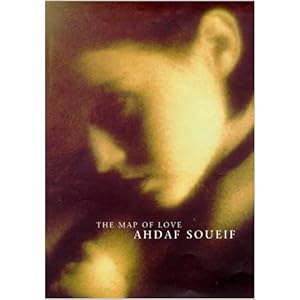Edition: Bloomsbury, 1999
Review number: 890
One of the books written in the last few years that I have most enjoyed was The God of Small Things. I wanted to read The Map of Love as it had received reviews making it sound similar, but now that I have I am rather disappointed. Some related themes - post colonialism written about from the point of view of the inhabitants of the former colony; the reaction of ancient civilisations to European control - has led to the novels provoking superficially the same reaction, though to me The God of Small Things is better written and immensely more interesting in what it has to say.
The Map of Love contains two parallel stories. In the early 1900s, young English widow Lady Anna Winterbourne moves to Cairo, and falls in love with Egyptian nobleman Shari Basha al-Baroudi. The two almost completely separate British and Egyptian communities in the city find this extremely difficult to deal with, and Anna is ostracised. In 1997, one of their descendants, the American Isabel Cabot, travels to Cairo with documents belonging to her great grandmother, having met and fallen for her cousin, international conductor Omar Ghamrawn. Together with Omar's sister, Isabel pieces together Anna's story, against a background of renewed nationalist unrest - the terrorist attack on Luxor tourists takes place while they are working.
The first reason that The Map of Love is not a novel which commands the attention is that it has these two rather hackneyed love stories, which could both come from trashy romantic fiction, at its centre. The concern with politics makes the novel a bit deeper than these romances, but this is not enough. It is the modern story which really drags things down. Anna's romance is much more interesting than Isabel's, and is set against an atmospheric background of real tension because of the British rule in Egypt (while Isabel is not so centrally connected to the nationalist violence going on in 1997). Each time the focus changes to Omar and Isabel, the reader just waits impatiently for a return to the earlier story. Even the discovery that Omar had an affair with Isabel's mother and might conceivably be her father - he is much older - is treated in such a way that it fails to kindle interest in their affair.
The relationship between British and Egyptian, as seen from the point of view of someone who moved from one culture to the other, could form the basis of an interesting novel, but this isn't it.
Wednesday 1 August 2001
Ahdaf Soueif: The Map of Love (1999)
Labels:
Ahdaf Soueif,
Egypt,
English literature,
fiction,
literary fiction
Subscribe to:
Post Comments (Atom)




No comments:
Post a Comment